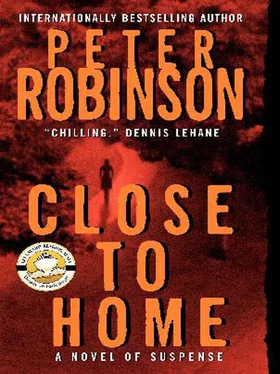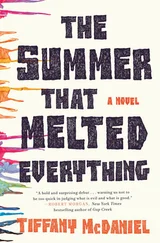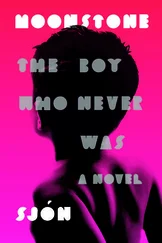“Jet Harris bent? I can’t believe it,” said Arthur Banks in The Coach and Horses early that evening. Banks had dragged him out there to tell him the full story, and they sat over their pints in the dreary, half-empty pub. Banks felt a craving for nicotine rush through his cells like a desperate need for air, but he pushed it aside. One day at a time. One craving at a time. It passed. People said the cravings got less and less powerful as time went on. But others said you were never rid of the habit. He knew people who had started again after they’d been off for ten years. One day at a time.
Arthur Banks stared at his son in disbelief. “Is this going to come out?” he asked.
“Probably,” said Banks. “We don’t actually hand our reports to the press, but they have their ways. Depends on the media interest.”
“Oh, there’ll be media interest around here, all right. Jet Harris, homo and bent copper.” He eyed Banks warily. “You sure you’re not going to hush it up, then?”
“Dad,” said Banks. “We don’t go in for cover-ups. At least I don’t, and nor does DI Hart. This investigation has cost her a lot. She’s only been at the division a couple of months and here she is, debunking the legend. Imagine how popular that’s going to make her around the place.” It had nearly cost Michelle her life, too, Banks thought. She would be safe from now on, he was certain, and not because of his melodramatic threat. Now Mandeville knew there were more people involved, he could hardly scare or kill off everyone. He would just have to take his chances that time had hidden his secrets.
“Why are you telling me? ” Arthur Banks asked.
Banks sipped some beer. “Dad, you and mum have never really given me a chance, you know, ever since I joined the force. You’ve always pointed out the negative side of the job. I just wanted you to know that some of us aren’t crooked, that some of us take our work seriously. Even if it never comes out in public, at least you’ll know the truth, and you’ll know I told you.”
Arthur Banks paused for a moment, looking his son in the eye, then he said, “And did you also find out what happened to your friend Graham after all these years?”
“Yes. Well, DI Hart did most of the work. I just filled in the blanks.” Banks leaned forward. “But yes, Dad, I found out. It’s what I do. I don’t go around waving rolls of fivers at striking miners, I don’t beat up suspects in the cells, I don’t botch investigations into murdered black youths, and I don’t steal confiscated drugs and sell them back on the street. Mostly, I push paper. Sometimes I catch murderers. Sometimes I fail, but I always do my damnedest.”
“So who did it?”
Banks told him.
“Donald Bradford! You’d have thought that would’ve been the first place they’d look.”
“That’s what made us suspect some sort of misdirection.”
“And Rupert Mandeville. That’ll make a nice headline.”
“If we can pin anything on him. Remember, it was a long time ago, and he’s hardly likely to confess.”
“Even so… Your pal Graham was up to no good, wasn’t he?”
“Why do you say that?”
“I don’t know. He always seemed a bit shifty to me, that’s all. Like his father.”
“Well, Graham wasn’t exactly walking the straight and narrow, but that’s no excuse for killing him.”
“Course not.” Banks senior fell silent for a moment, contemplating his son through narrowed eyes. Then he let slip a thin smile. “You’ve stopped smoking, haven’t you?”
“I wasn’t going to tell anyone.”
“There’s not much you can slip past your own father.”
“Dad, have you been listening to me? All I’ve been trying to demonstrate to you all these years,” Banks went on, “is that I’ve been doing a decent, honest day’s work, just like you did.”
“And Jet Harris, local legend, was a bent copper?”
“Yes.”
“And you’re going to expose him.”
“Something like that.”
“Well,” said Arthur Banks, rubbing his hands together. “That’s all right, then. You’ll be having another pint, I suppose? On me, this time.”
Banks looked at his watch. “Better make it a half,” he said. “I’ve got a date.”
Was it the age of my innocence,
Or was it the lost Land of Oz?
Was it only a foolish illusion,
The summer that never was?
Did I walk through the fields with the child in my arms
And the golden wheat over my head?
Did I feel my heart breaking under the weight?
Was my sweet sleeping boy child a burden, like lead?
I remember him crying the day he was born
And his hand like a spider that wouldn’t let go
And he wouldn’t let go and he wouldn’t let go
And the pain tore my heart out and filled me with woe.
Can a dreamer take hold of reality
And become a responsible man?
Can a killer become a lover
Or is he forever damned?
You can’t follow me where I’m going now
And you can’t go the places I’ve been
Don’t listen to the demons I’ve listened to
Or look into the darkness I’ve seen.
There’s a field and a boy and the tall golden wheat
And eternity held in a day
But it’s so hard to hold and it’s so hard to reach
And forever rushing away
Was it the age of my innocence,
Or was it the lost Land of Oz?
Was it only a foolish illusion,
The summer that never was?
Banks lay in bed late that night listening to Neil Byrd’s CD on his Walkman after dinner with Michelle and a phone call from Annie. “The Summer That Never Was” was the first song on the CD, though the liner notes said it was the last song Byrd had recorded, just weeks before his suicide. As Banks listened to the subtle interplay of words and music, all set against acoustic guitar and stand-up bass, with flute and a violin weaving in and out, like Van Morrison’s Astral Weeks, he felt the despair and defeat of the singer. He didn’t understand the song, didn’t know what all the tortured phrases meant, only that they were tortured.
Here was a man at the end of his tether. And he was thinking of his child, or of his own childhood. Or both.
Banks couldn’t even begin to imagine what this had meant to Luke Armitage when, his mind disoriented with strong cannabis, he had heard it for the first time in Liz and Ryan’s flat. Annie was right. How callous could the bastards be? Or stupid. It no doubt never even entered their addled minds what damage they might be doing. All they could think of was opening up Luke’s mind to his father’s music to further their careers, and everyone knew that drugs opened the doors of perception.
Banks remembered the Rimbaud quote written in silver on Luke’s black wall: “Le Poëte se fait voyant par un long, immense et raisonné dérèglement de tous les sens.”
Well, had Luke become a seer? What had he seen? Was he trying to kill himself with the diazepam, or was he just trying to stop the pain?
In Banks’s mind, Luke Armitage and Graham Marshall became one. They might have died in different ways for different reasons – not to mention in different times – but they were just two kids lost in a grown-up world where needs and emotions were bigger than theirs, stronger and more complex than they could comprehend. Graham had tried to play the big leagues at their own game and lost, while Luke had tried to find love and acceptance in all the wrong places. He had lost, too. Accident though his death was, according to Annie, it was a tragic accident made up of many acts, each one of which was like a door closing behind Luke as he moved toward his fate.
Читать дальше












